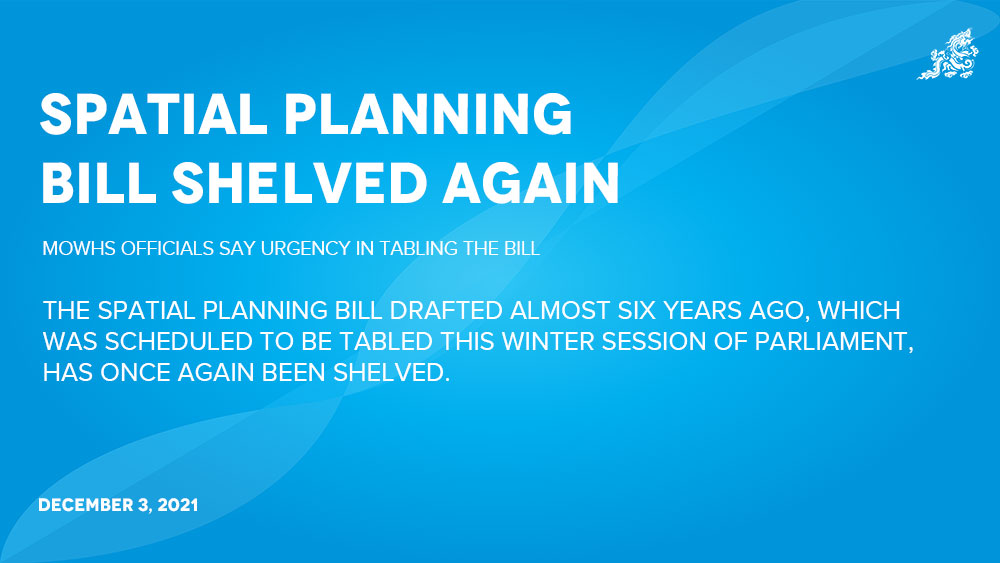MoWHS officials say urgency in tabling the Bill
The Spatial Planning Bill drafted almost six years ago, which was scheduled to be tabled this winter session of Parliament, has once again been shelved.
The Ministry of Works and Human Settlement drafted the Bill in 2015. That same year, the ministry submitted it to the Cabinet for further submission and deliberation in Parliament.
The Bill was to guide development plans being implemented across the country and those in the pipeline.
Zhabtog Lyonpo Dorji Tshering said the Bill was shelved after the Cabinet felt there was a requirement for further review.
“The draft, otherwise, has followed and passed all the processes for drafting,” Lyonpo said. “While I respect the Cabinet’s decision to review, the enactment of the Bill is important for the ministry, including for the larger interest of the planning system.”
Although Lyonpo did not specify, he said that the Cabinet directed the ministry to review the draft again.
This is not the first time the Bill was shelved. The Bill, according to ministry officials, was also submitted to the Cabinet during the People’s Democratic Party government’s tenure.
Also agreed by the minister, some of the officials shared that a Spatial Planning Act would provide a legal mandate to the existing plans, which is why the ministry treats the Bill as urgent. However, the Bill never made it to Parliament.
Apart from the ministry, the Royal Audit Authority in 2019 during the performance audit report on urban planning development in Thimphu Thromde also recommended that the ministry expedite the enactment of the Bill.
The Audit also stated that spatial planning would provide clarity on decision making powers and roles and responsibilities of agencies involved in the implementation of structural plans.
The Bill, if approved, will minimise the damage being done to development plans currently being implemented, the audit pointed out.
The Spatial Planning Bill
Spatial by definition means ‘relating to, occupying, or having the character of space’ and the objective of spatial planning is to provide for fair, orderly, economic and sustainable use of land, according to the draft Bill.
The scope is to implement, in spatial terms, the plans, policies, and regulatory requirements of the national and local governments.
The Act would have also clearly spelt out the powers and functions of the ministry, Dzongkhag thromde, Yenlag thromde, and gewogs in structural planning.
Its framework would comprise three levels, national spatial plan, regional spatial plan, local spatial plan (comprising the valley development plan, structural plan, Local Area Plan, and Action Area Plan).
Research finds otherwise
Contrary to what the ministry officials shared on the importance of the Bill, a recent study found that considering all-encompassing planning power, the ministry should continue to only provide technical backstopping vis-à-vis spatial planning, rather than serving as a full-fledged body overlooking spatial planning matters.
A study, titled A Review of Planning System in Bhutan 2021 (Wangchuk Dema et al), researchers with the Centre for Bhutan and GNH Studies recommends that Bhutan have a separate authoritative body and the ministry should hand over the affairs of spatial Planning.
“In case a separate body is not feasible due to several reasons, including constraints on financial and human resources, the ideal option is to leverage the existing roles and responsibilities of the planning commission of the country,” the study recommended. “In the case of Bhutan, the best agency to take the lead in spatial planning would be Gross National Happiness Commission (GNHC) secretariat, given its extensive planning coverage, mandates, and rights.”
The study opined that it was timely and appropriate for GNHCS to be a nodal agency for spatial planning that is already responsible for integrating cross-cutting issues like social, economic, and environmental matters.
The study also recommends vertical integration which is coordination between the national and local levels from a spatial lens.
“While the ministry has also acknowledged that the spatial planning is a multi-faceted approach, an agency rooted mostly in technicality will not be able to implement spatial planning to promote horizontal integration,” the study found. “The Comprehensive Development Plan that has some new developments on spatial planning was handed over to GNHC by MoWHS in 2019 for its implementation.”
The study stated that this was an indication of trust in the Planning Commission by the ministry to be able to coordinate the implementation of plans, including spatial plans.
It recommended an institutional setup responsible for spatial planning with the GNHC identified as the right agency within the broader context of planning.
“The spatial planning system of the country needs proper ramifications suiting to the developmental needs of the modern world at the same time, spatial plans at all levels particularly gewog level requires more attention to bring about a balanced regional development.”
Contributed by Yangchen C Rinzin
Kuensel Research Fellow
Centre for Bhutan and GNH Studies
Edited by Tshering Palden


